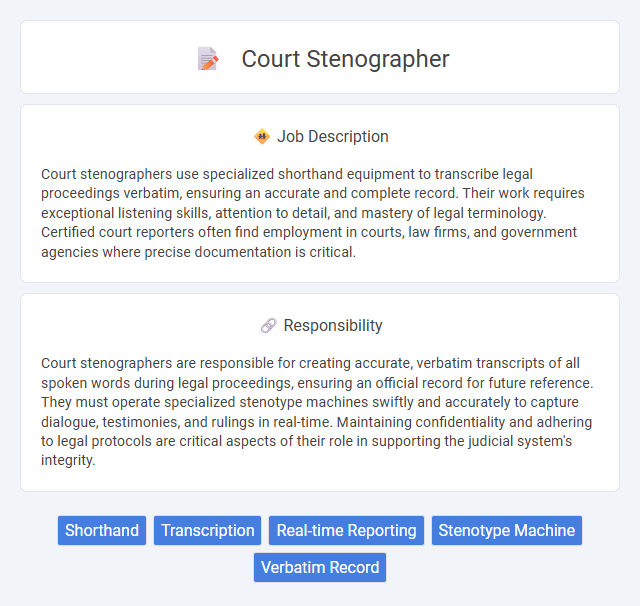
Court stenographers use specialized shorthand equipment to transcribe legal proceedings verbatim, ensuring an accurate and complete record. Their work requires exceptional listening skills, attention to detail, and mastery of legal terminology. Certified court reporters often find employment in courts, law firms, and government agencies where precise documentation is critical.
Individuals with strong typing skills and excellent attention to detail may likely find a court stenographer role suitable, as the job demands accurate transcription under pressure. Those who can maintain focus for long periods and thrive in quiet, structured environments will probably adapt well to the demands of the courtroom setting. People who prefer dynamic or highly interactive tasks might find this position less fitting due to its solitary and repetitive nature.
Qualification
Court stenographers must possess exceptional shorthand and transcription skills, typically acquired through specialized training programs or associate degrees in court reporting. Proficiency in legal terminology and rapid, accurate typing at speeds exceeding 200 words per minute are essential qualifications. Certification from recognized bodies such as the National Court Reporters Association (NCRA) enhances job prospects and validates professional expertise.
Responsibility
Court stenographers are responsible for creating accurate, verbatim transcripts of all spoken words during legal proceedings, ensuring an official record for future reference. They must operate specialized stenotype machines swiftly and accurately to capture dialogue, testimonies, and rulings in real-time. Maintaining confidentiality and adhering to legal protocols are critical aspects of their role in supporting the judicial system's integrity.
Benefit
Court stenographers likely enjoy benefits such as competitive salaries and job stability due to steady demand in legal settings. They may also receive healthcare and retirement plans that support long-term financial security. Opportunities for freelance work or flexible schedules could further enhance their work-life balance.
Challenge
Court stenographers likely face the challenge of maintaining high-speed, accurate transcription during fast-paced legal proceedings, which demands exceptional concentration and skill. The probability of encountering technical difficulties with stenography equipment also presents a significant hurdle. Furthermore, adapting to various dialects and complex legal terminology may increase the difficulty of producing precise transcripts.
Career Advancement
Court stenographers can advance their careers by gaining certification from organizations like the National Court Reporters Association, which enhances job credibility and opportunities. Specializing in areas such as real-time transcription or captioning for the hearing impaired can lead to higher-paying positions and increased demand. Experienced stenographers may also pursue roles as freelance reporters, legal transcription managers, or trainers, expanding their professional scope and income potential.
Key Terms
Shorthand
Court stenographers utilize specialized shorthand techniques to transcribe spoken words quickly and accurately during legal proceedings. Mastery of stenographic machines enables real-time documentation, ensuring precise records for court transcripts and legal reference. Proficiency in shorthand reduces errors and enhances the efficiency of judicial communication and documentation processes.
Transcription
Court stenographers specialize in real-time transcription, capturing every spoken word during legal proceedings with exceptional accuracy. Utilizing shorthand machines or stenotype keyboards allows them to quickly and precisely document courtroom dialogue for official records. Their transcriptions ensure verbatim coverage that supports legal review, appeals, and record keeping within the judicial system.
Real-time Reporting
Court stenographers specializing in real-time reporting use advanced stenotype machines and software to transcribe spoken words instantly during legal proceedings. This technology enables real-time captioning and immediate access to transcripts for judges, attorneys, and clients, enhancing courtroom efficiency and accuracy. Mastery of real-time reporting requires exceptional typing speed, strong language skills, and thorough knowledge of legal terminology.
Stenotype Machine
Court stenographers utilize stenotype machines to transcribe spoken words into shorthand symbols at speeds exceeding 200 words per minute. This specialized equipment enables real-time transcription, ensuring accurate and efficient documentation of legal proceedings. Mastery of the stenotype machine is essential for producing verbatim records critical to court cases and official records.
Verbatim Record
Court stenographers create an exact verbatim record of courtroom proceedings using specialized shorthand machines. Their precise transcription ensures every spoken word is captured, supporting legal accuracy and accountability. Mastery of real-time transcription technology is essential for producing reliable official court documents.
 kuljobs.com
kuljobs.com